Volume 5, Issue 48: Mergers and Acquisitions
"Don't make me go down there. I'm tryin to free myself up and do a little global thinking."
Here is a button where you can subscribe to this newsletter now, if you have not previously done so. I do hope that you enjoy it.
A few weeks ago, at a Georgia football tailgate—no, not last night’s Georgia tailgate, though if today’s newsletter reads wobbly to you at all, what happened at Sanford Stadium last night is very much the reason why—my wife and I ran into a guy we know. I like him, he’s a nice guy, but we only really see him at football games. He, like just about everybody at the tailgate for an important game that didn’t start until 7:30 p.m., including me, was pretty deep into the bourbon. He lives about three hours away, and my wife asked him where he was staying in Athens.
“Oh, we’re driving back home tonight,” he said.
My wife raised an eyebrow. “That’s quite a drive,” she said.
He smiled. “I’m not worried about it,” he said. “I’ve got the Tesla.”
He then explained to us just how often he lets his car drive for him. It’s a pretty regular thing! He routinely just plugs in the address of his destination, then kicks back and gets caught up on work emails. “That thing can spot a dog from 200 yards away,” he said. "It’s a truly incredible machine.” He said he wasn’t worried about a thing.
I looked at him with wonder. But I could only shrug. Grappling with my fellow Americans’ self-destructive decision-making processes is something I’ve had a lot of practice with lately, and I’ve gotten better, at last, at not letting it send me spinning off. I simply shook his hand and whistled. “You have a lot more faith in Elon Musk than I do, man,” I said. I found out later that he ended up staying in Athens and not driving, or “driving,” home that night after all. I bet that’s how he got home the next day, though. If he didn’t end up driven into a ditch.
This past Thursday, I told this story at the Thanksgiving table, thinking it would be an amusing anecdote, you’ll never believe this. I hit all the punch lines right; I love a good look at this craziness story at the Thanksgiving table. When I was done, my brother-in-law grinned. “Oh, that’s totally a thing,” he says. “All the guys I know do that all the time. That’s why they have a Tesla in the first place.”
And apparently … it is? I had always thought that drivers were using Tesla’s “Full Self Driving” mode as slightly more advanced versions of my car’s blind spot side mirror, or how my car beeps at me if I briefly veer out of my lane; a helpful tool, but something you obviously would never fully rely upon, what are you insane? But the practice of plugging in an address into your Tesla, then kicking back and playing a game on your phone until you get home seems to be far more common that I had ever fathomed.
On one hand, this makes me feel a little better about my increasing sense that drivers have gotten dramatically worse in the last 5-10 years. On the other, it makes me feel rather stupid to realize that the people I’ve been cursing to the air in traffic were probably robots this whole time.
But the more I thought about it, the more it sort of blew my mind. Not so much what one might consider a reckless disregard for one’s safety and the safety of those around them—though, again, I don’t find myself looking at Elon Musk much these days and thinking “that’s a guy with whom I’d trust the lives of my loved ones”—but more the principle of the thing: You want someone else to drive? You don’t want to do it yourself? Wait … why don’t you want to do it yourself? What else don’t you want to do yourself?
Getting older is, really by design, supposed to confuse you. New things come along that are perfectly natural for people who grew up with them but are different than the way you’ve personally always done them—and therefore feel inherently wrong. This does not make them inherently wrong, of course. It just makes them different than what you’re used to. But it doesn’t make them inherently right either.
One of the most exciting aspects of the Internet to me, when it emerged in the late ‘90s (I didn’t have my first email address until my senior year of college), was that it gave its users a previously unavailable autonomy. To express yourself, no longer did you need a printing press, or a senior-level media job, or a book contract. To learn new information, you didn’t have to rely on whatever publications you might have your limited access to. It was all open to you. You could choose your adventure. You could discover your own voice, you can open yourself up to different experiences, you could meet people you never could have met before. You could, in a way that had not previously been possible, do it yourself. It was thrilling to have the opportunity, as a writer, to go out and create the world I wanted to live in, to make the things I wanted to make the way I wanted to make them, in a way that never would have been available otherwise. I typed in a box, people read it, they responded to it, and I didn’t have to compromise it, or sell it, or give anyone else power over it. And anyone in the world could do that. The Internet was, in its purest sense, freedom.
The power to do that—the ability to write these words to you, exactly how I want to write them—has been the single organizing principle of my life, and it has opened doors to me I would have never imagined. But even if you’re not a writer, this has always been the promise of the Internet: It’s a place where you can choose what you want. It’s a place where you can choose to be you—to figure out, exactly, what that might mean.
Which is why it is so staggering to me how people have come to opt out of this choice entirely—and how ingrained into the culture it has already become.
The most obvious place to start is through AI, specifically ChatGPT, which has become so common for college students that professors now pay for programs specifically to snuff out artificially created essays. I’ve noticed, even among my kids’ friends, young people tend to use ChatGPT the way we used Google, as a default search engine, or just a place to construct thoughts before having to bother to do so themselves.
The most obvious problem here, from the get-go, is that ChatGPT, and really all AI-services, are somehow still completely terrible, despite an investment of tech resources so vast that these products keep being foisted upon us in every aspect of our digital lives even though we have not asked for them and they do not work. How is ChatGPT, with all the work that has gone into it, with all the capital invested in it, with all the information it can comb through, still this bad?
But even if it were much, much better than it is (and I assume it someday will be?), I still don’t understand why people would want to use it. The ability to organize your own thoughts—either through writing them down, or just simple, straightforward cognitive processing—is fundamental to being a person. It is what makes us who we are. The notion that someone would want to outsource this to a robot—or, worse, to allow a corporation to define it for them so that corporation may more efficiently sell you shit—deprives us of the very point of being a human being in the first place. It’s not about being a good writer, or even a good person. It’s about having your thoughts and beliefs and emotions be your own. It’s about having control of your own life.
That, to me, is what I find most confusing as I get older, my sitting-at-the-breakfast-table-and-grousing-”the whole world’s going straight to hell” moment:
It’s not that people are making choices that are different than the ones I would make, or that people are somehow worse than they were before, or even that we’re staring at our phones too much in the first place. I use many of these services myself, after all. It’s that it has become commonplace, even almost trendy, to opt out of decision making entirely. We let Spotify tell us what music we like. We let Amazon tell us what we want to buy. We let ChatGPT tell us how to express ourselves, or even how to construct thoughts in the first place. We let YouTube, Netflix and TikTok algorithms tell us what we want to watch. We let our cars drive us around. We all have infinite options, the opportunity to make the world whatever we want it be, to discover who we are and what we might have to offer this life and the people in it, and it is becoming increasingly clear that we are collectively deciding to beg out of it entirely. We had the opportunity to use technology and connectivity as a way to elevate ourselves, to evolve into something bigger, to discover our best selves. We have instead ceded everything. We have become a Trad Wife to technology.
I don’t know how to fix this, and, more to the point, I’m not sure people even want to. Life is hard, you know? It’s exhausting to be alive. It’s easier, even comforting, sometimes, to let someone else take the wheel. But, at the (very real) risk of sounding hectoring or helplessly lame, we only get to do this once, people. This is the sole life you get to live. Maybe we should try to actually live it? Because one thing is clear: These tech companies, their algorithms, their ravenous need to shove us away from a life that belongs to us … they’re driving us into a ditch.
Here is a numerical breakdown of all the things I wrote this week, in order of what I believe to be their quality.
The Lions Are Finally the Team to Watch On Thanksgiving, The Washington Post. Something to distract everybody from their families!
Denzel Washington Movies, Ranked, Vulture. Updated with Gladiator II.
Best Active Players Not to Win an MVP, MLB.com. Ohtani and Judge are hoggin’ ‘em.
Who Will Be Better in 2025: Verlander, Scherzer or Kershaw? MLB.com. I might go with .. Kershaw?
Five Teams Under Pressure After the Blake Snell Deal, MLB.com. I like doing some quick Thanksgiving Eve reacts.
Something For Every Team To Be Thankful For on Thanksgiving, MLB.com. The annual staple.
PODCASTS
Grierson & Leitch, we discussed “Wicked,” “Gladiator II” and “The Piano Lesson.
Waitin’ Since Last Saturday, we reviewed the Massachusetts game and previewed the Georgia Tech game.
Morning Lineup, I did no shows this week.
LONG STORY YOU SHOULD READ THIS MORNING … OF THE WEEK
“The False Premise Shaping Trump’s Public Health Picks,” David Wallace-Wells, The New York Times. I know it feels like I link every DWW piece, but this one is particularly good, about the things we think we got wrong about the pandemic and the things we actually got wrong about the pandemic are exactly backward.
ONGOING LETTER-WRITING PROJECT!
This is your reminder that if you write me a letter and put it in the mail, I will respond to it with a letter of my own, and send that letter right to you! It really happens! Hundreds of satisfied customers! (Got some more of these out this week, stand by.)
Write me at:
Will Leitch
P.O. Box 48
Athens GA 30603
CURRENTLY LISTENING TO
“She Cleans Up,” Father John Misty. It took me way too long to get into Father John Misty. I’m in the midst of correcting that now.
Remember to listen to The Official Will Leitch Newsletter Spotify Playlist, featuring every song ever mentioned in this section. Let this drive your listening, not the algorithm!
Also, there is an Official The Time Has Come Spotify Playlist.
If this newsletter seemed groggier than usual, yeah, you should probably blame that Georgia-Georgia Tech game last night. After that experience, I’m pretty sure everyone in this picture, taken right after the final play, is now common-law married.
I hope you had a grand Thanksgiving. We had our Kennedy compound football game.
Have a grand weekend, all. Go Illini. Be safe out there.
Best,
Will

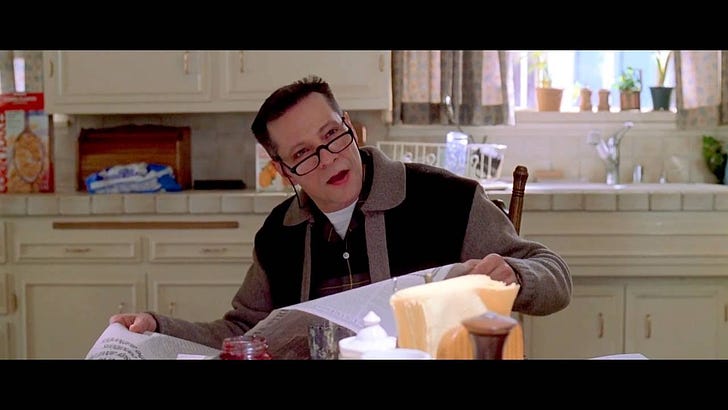

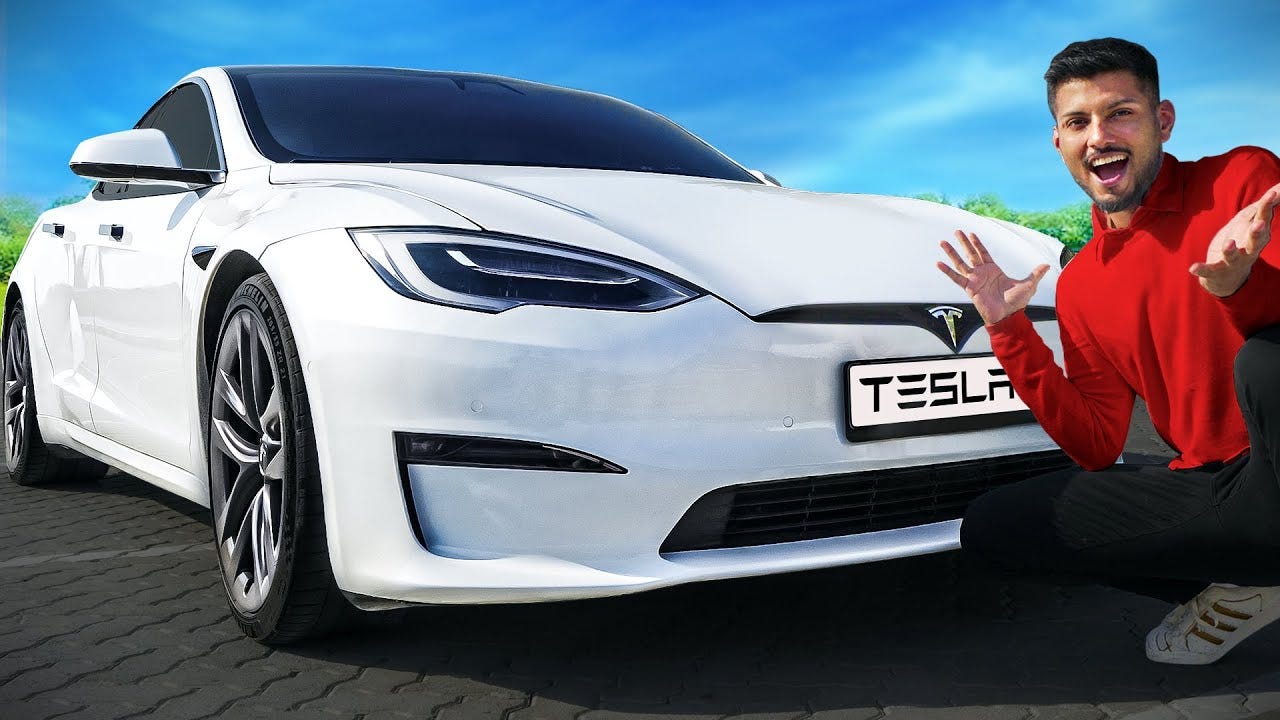

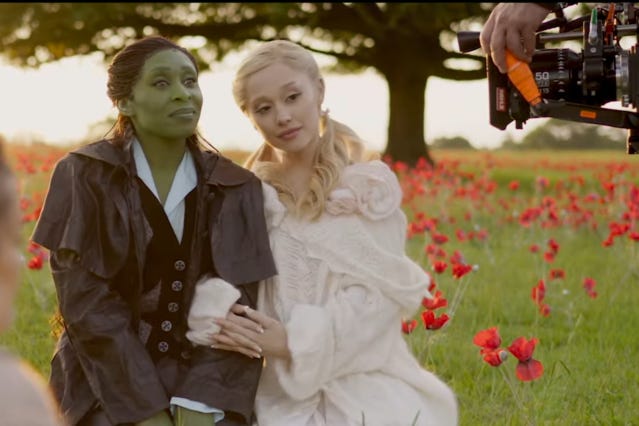
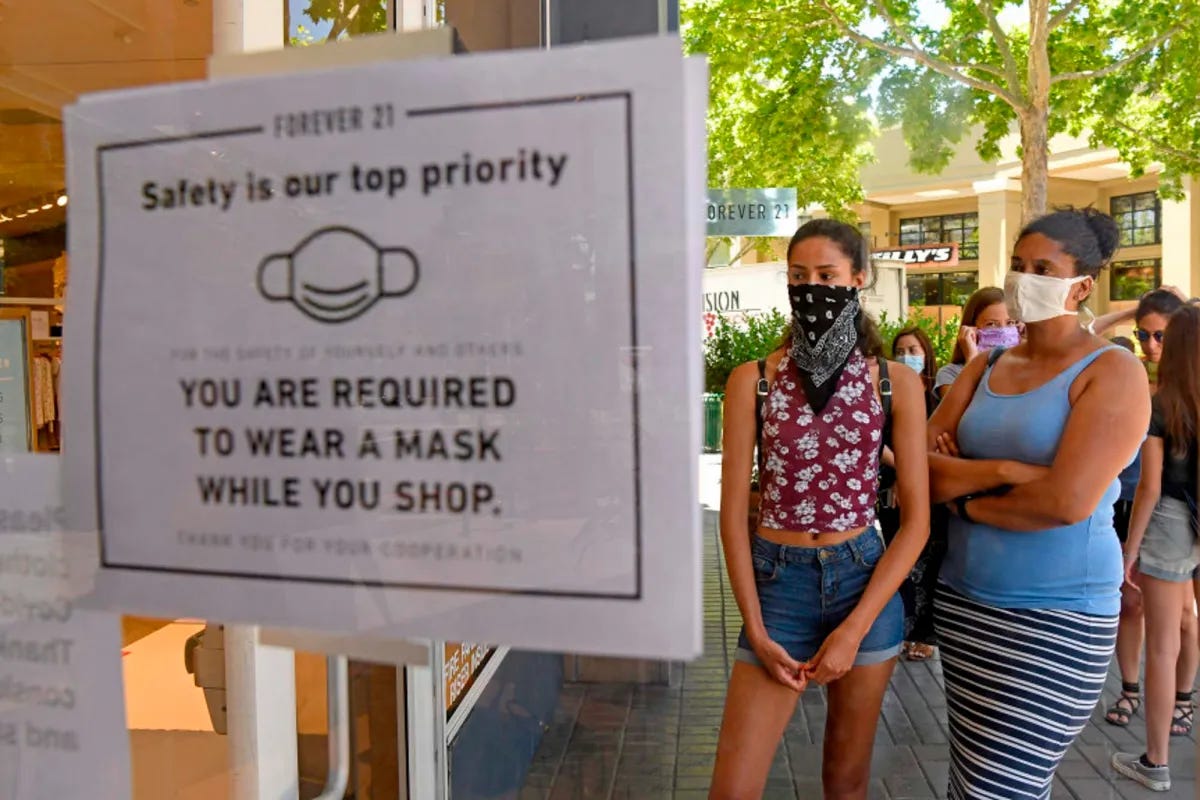
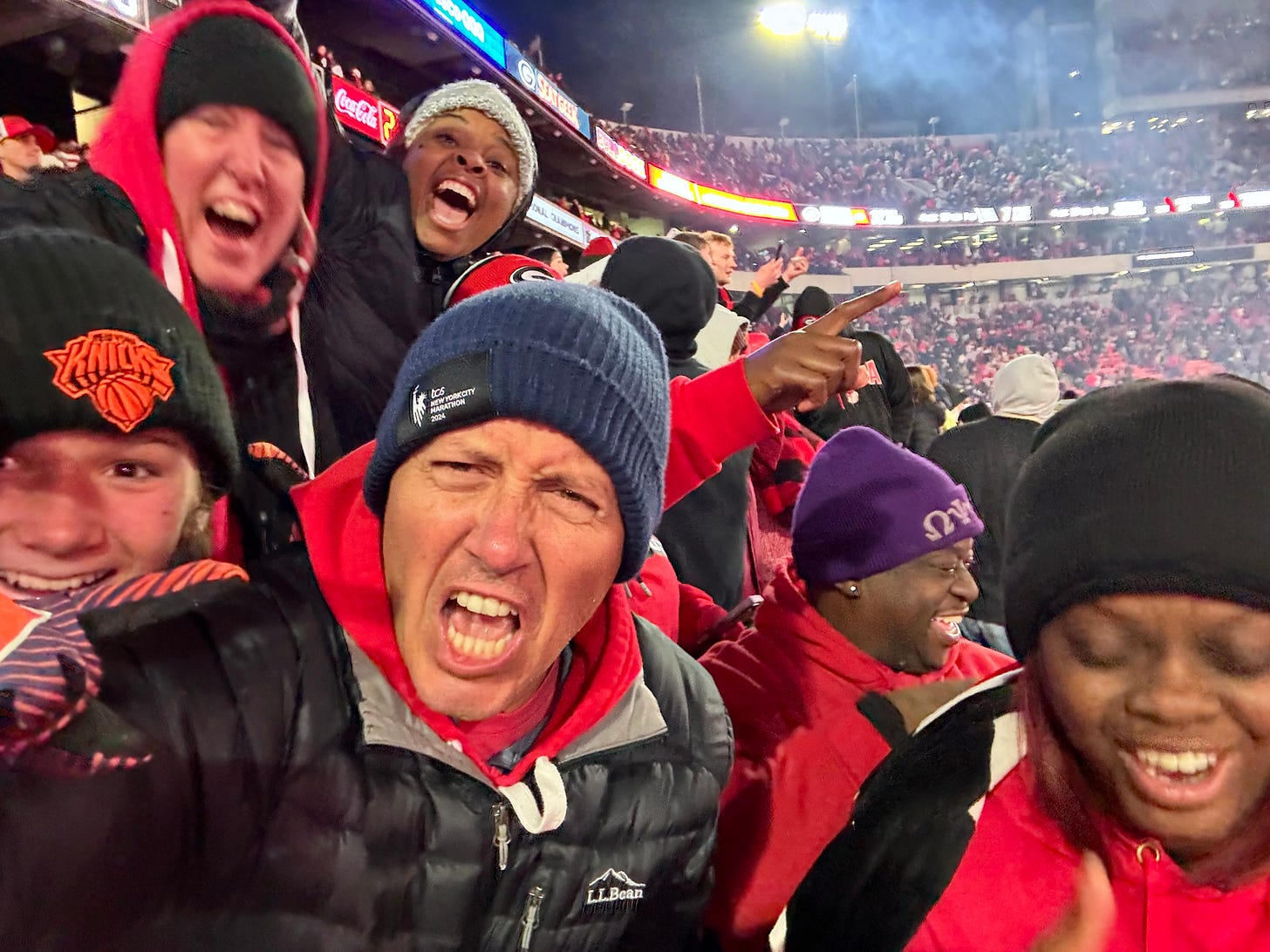

The wildest thing about the self-driving mode thing is that these same folks would call investment in public transportation (i.e. the original self-driving mode option) a waste of time and money because tech is only good if it only benefits you and not the greater good.
I've been thinking a lot lately about the scene from WALL-E where the people just ride around on their little floating scooters, let machines do everything for them, and stare, glassy-eyed and empty-brained, at screens. Back when the movie was made, it seemed a little over the top. But events since the movie was made make the filmmakers look pretty prescient...